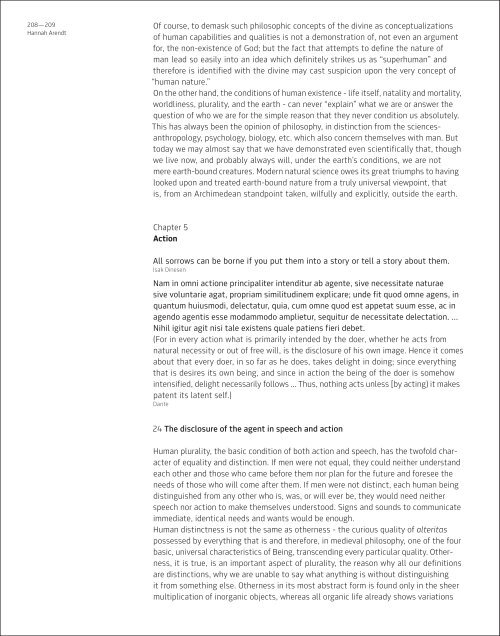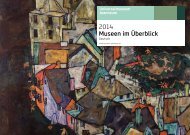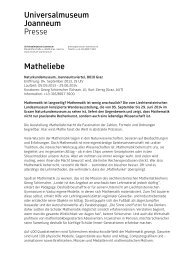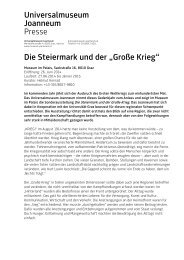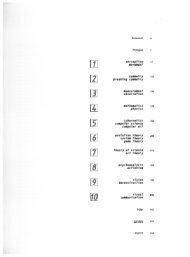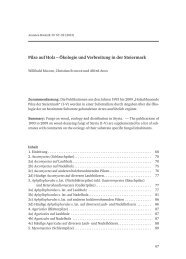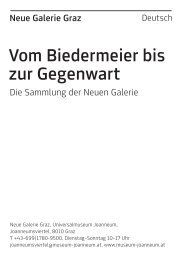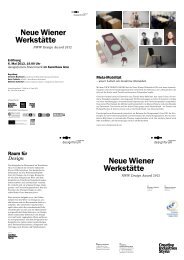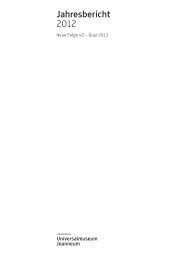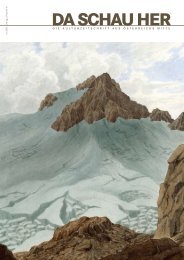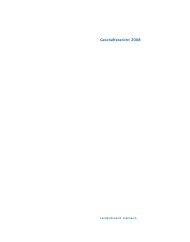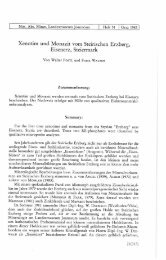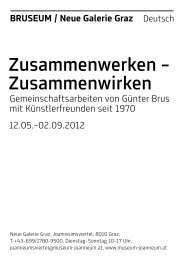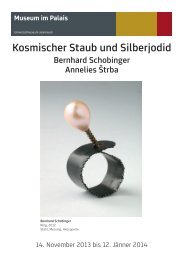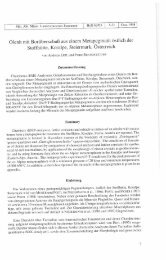Human Condition - Universalmuseum Joanneum
Human Condition - Universalmuseum Joanneum
Human Condition - Universalmuseum Joanneum
Sie wollen auch ein ePaper? Erhöhen Sie die Reichweite Ihrer Titel.
YUMPU macht aus Druck-PDFs automatisch weboptimierte ePaper, die Google liebt.
208 — 209<br />
Hannah Arendt<br />
Of course, to demask such philosophic concepts of the divine as conceptualizations<br />
of human capabilities and qualities is not a demonstration of, not even an argument<br />
for, the non-existence of God; but the fact that attempts to define the nature of<br />
man lead so easily into an idea which defi nitely strikes us as “superhuman” and<br />
therefore is identified with the divine may cast suspicion upon the very concept of<br />
“human nature.”<br />
On the other hand, the conditions of human existence - life it self, natality and mortality,<br />
worldliness, plurality, and the earth - can never “explain” what we are or answer the<br />
question of who we are for the simple reason that they never condition us absolute ly.<br />
This has always been the opinion of philosophy, in distinction from the sciencesanthropology,<br />
psychology, biology, etc. which also concern themselves with man. But<br />
today we may al most say that we have demonstrated even scientifically that, though<br />
we live now, and probably always will, under the earth’s conditions, we are not<br />
mere earth-bound creatures. Modern nat ural science owes its great triumphs to having<br />
looked upon and treated earth-bound nature from a truly universal viewpoint, that<br />
is, from an Archimedean standpoint taken, wilfully and explicitly, outside the earth.<br />
Chapter 5<br />
Action<br />
All sorrows can be borne if you put them into a story or tell a story about them.<br />
Isak Dinesen<br />
Nam in omni actione principaliter intenditur ab agente, sive necessitate naturae<br />
sive voluntarie agat, propriam similitudinem explicare; unde fit quod omne agens, in<br />
quantum huiusmodi, delectatur, quia, cum omne quod est appetat suum esse, ac in<br />
agendo agentis esse modammodo amplietur, sequitur de ne cessitate delectation. ...<br />
Nihil igitur agit nisi tale exi stens quale patiens fieri debet.<br />
(For in every action what is primarily intended by the doer, whether he acts from<br />
natural necessity or out of free will, is the disclosure of his own image. Hence it comes<br />
about that every doer, in so far as he does, takes delight in doing; since everything<br />
that is desires its own being, and since in action the being of the doer is somehow<br />
inten sified, delight necessarily follows … Thus, nothing acts unless [by acting) it makes<br />
patent its latent self.)<br />
Dante<br />
24 The disclosure of the agent in speech and action<br />
<strong>Human</strong> plurality, the basic condition of both action and speech, has the twofold character<br />
of equality and distinction. If men were not equal, they could neither understand<br />
each other and those who came before them nor plan for the future and foresee the<br />
needs of those who will come after them. If men were not dis tinct, each human being<br />
distinguished from any other who is, was, or will ever be, they would need neither<br />
speech nor action to make themselves understood. Signs and sounds to communicate<br />
immediate, identical needs and wants would be enough.<br />
<strong>Human</strong> distinctness is not the same as otherness - the curious quality of alteritas<br />
possessed by everything that is and therefore, in medieval philosophy, one of the four<br />
basic, universal charac teristics of Being, transcending every particular quality. Otherness,<br />
it is true, is an important aspect of plurality, the reason why all our definitions<br />
are distinctions, why we are unable to say what anything is without distinguishing<br />
it from something else. Other ness in its most abstract form is found only in the sheer<br />
multipli cation of inorganic objects, whereas all organic life already shows variations


